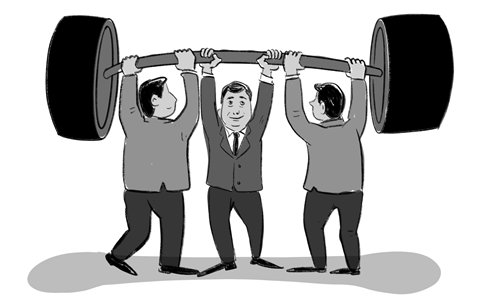HOME >> BUSINESS
China’s coordinative development economics powers up economy, global governance
By Liu Zhiqin Source:Global Times Published: 2019/7/11 21:08:41

Illustration: Luo Xuan/GT
Chinese culture is tenacious enough to grow continuously and prosper due to its core value, coordination.
With coordinative measures, China has pushed for progress and the evolution of history. Following the coordinative principle, the country has dealt with many historical issues and built up a foundation for modernization.
In the 40 years since China's reform and opening-up began, its economic miracle has amazed the world. Many have tried to decipher the code of China's successful economic development.
China's reform and opening-up has given coordinative development economics a solid platform. Some may say China's success in reform and opening-up has benefited from a cheap labor force, hard-working Chinese people and wise government policy, but one thing that should not be ignored is that the economics of coordinative development spawned tremendous creativity. Creativity and innovation have filled the Chinese economy with vitality and helped it succeed by overcoming difficulties.
In the 30 years from 1949 to 1979, with coordinative development economics, China implemented joint state-private ownership and promoted its five-year plans. Those efforts restored China's economy, which was on the brink of collapse, and put it on the right track. The coordinative policy saved China's economy.
Each of the four decades of China's reform and opening-up has had its own theme. The first 10 years were right after the Cultural Revolution (1966-76) and great effort was required to change the old rules and regulations. Coordinative policy refurbished the old mechanism and after the change, China was ready to take off.
After the old rules and regulations were changed, it was necessary to remove barriers impeding productivity. China entered into a new phase of reform. A new set of problems, such as a balance between industrial and agricultural development, the interconnected foreign exchange and the yuan, as well as the structure of imports and exports, started to emerge. Policies favoring coordinative development once again served as an anchor to solve problems. The second 10 years had great significance to China's reform. China's role became increasingly important on the international stage.
As the first two phases were carried out smoothly, China opened its arms wider to the international market. However, with no experience and a weak economic foundation, China, in the first 20 years of reform and opening-up, was not bold or open enough although it had always had an eye on the global market.
Especially since China became a WTO member, a new stage of opening-up has been unlocked. What triggered the opening was the coordination method the country had been sticking with. This development concept worked to unravel issues brought by urbanization and industrial transformation. It also reconciled the conflict between development and environment, state-owned enterprises and private firms. Overall, it assisted China to steer away from an economic hard landing so that it could gradually blend into the international market, production chain and supply chain, and build up its own prestige and honor.
During the fourth 10 years, the Chinese economy faced many challenges, including how to better foster innovation, eco-friendly development and sustainable development. While continuously opening-up, China had to give the market more freedom. Some industries and sectors had been opened but still faced market access restrictions. This situation has cooled down the enthusiasm for Chinese companies to go abroad. The Chinese government has implemented a large number of policies to free up the market.
Foreign Investment Law and a shortened negative list have attracted more foreign investment. Strategies like launching multiple free trade zones have pumped up the Chinese economy to an unprecedented level. China is the second largest economy in the world and keeps moving forward. Despite the US adopting protectionism and blocking the Chinese technology industry, coordinative development economics has become a powerful weapon of the Chinese economy. China's march toward reform and opening-up will not slow down.
This development philosophy not only makes tremendous contributions to China's economic development, but has also been learned by other countries. The Belt and Road Initiative has brought the idea to the world. China's economy bears the mark of coordinative development and has provided a model for economies elsewhere.
The miracle of Chinese economic development is fundamentally to coordinate every factor and make each factor function well. In this way, the innate impetus will drive up the country's economy.
Coordinative development has become a term that attracts worldwide attention. China's coordination philosophy has become a key concept for global governance. The economics of coordinative development will definitely provide the world with policy solutions and strength.
The author is a senior fellow of the Chongyang Institute for Financial Studies at Renmin University of China. bizopinion@globaltimes.com.cn
Posted in: EXPERT ASSESSMENT